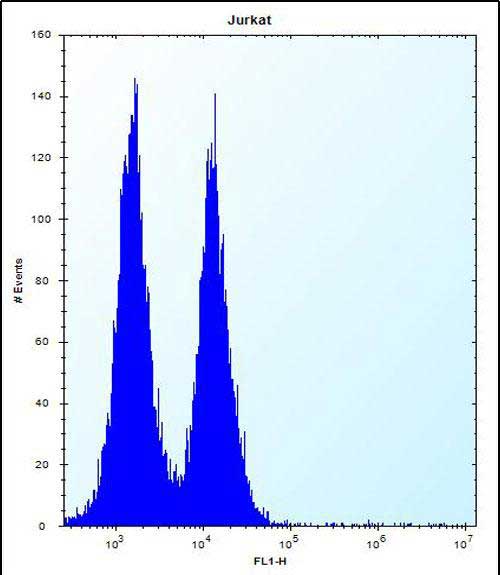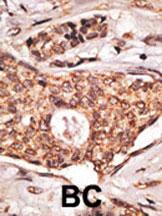


| WB | 咨询技术 | Human,Mouse,Rat |
| IF | 咨询技术 | Human,Mouse,Rat |
| IHC | 1/100-1/500 | Human,Mouse,Rat |
| ICC | 技术咨询 | Human,Mouse,Rat |
| FCM | 1/10-1/50 | Human,Mouse,Rat |
| Elisa | 咨询技术 | Human,Mouse,Rat |
| Aliases | Inducible T-cell costimulator, Activation-inducible lymphocyte immunomediatory molecule, CD278, ICOS, AILIM |
| Entrez GeneID | 29851 |
| WB Predicted band size | 22.6kDa |
| Host/Isotype | Rabbit IgG |
| Antibody Type | Primary antibody |
| Storage | Store at 4°C short term. Aliquot and store at -20°C long term. Avoid freeze/thaw cycles. |
| Species Reactivity | Human |
| Immunogen | This ICOS antibody is generated from rabbits immunized with a KLH conjugated synthetic peptide between 156-185 amino acids from the C-terminal region of human ICOS. |
| Formulation | Purified antibody in PBS with 0.05% sodium azide. |
+ +
以下是关于ICOS抗体的3篇代表性文献及其摘要内容:
1. **文献名称**:*Targeting ICOS in cancer immunotherapy: tumor-directed agonistic antibodies for enhanced T cell activation*
**作者**:Zappasodi R, et al.
**摘要**:该研究开发了一种靶向ICOS的激动型抗体,通过增强T细胞的共刺激信号,促进抗肿瘤免疫反应。实验显示,该抗体在多种小鼠肿瘤模型中显著抑制肿瘤生长,并与PD-1抑制剂联用表现出协同效应,揭示了ICOS激动剂在联合免疫治疗中的潜力。
2. **文献名称**:*ICOS blockade limits pathogenic CD4+ T cell responses in lupus-prone mice*
**作者**:Odegard JM, et al.
**摘要**:研究探讨了ICOS信号在系统性红斑狼疮(SLE)模型中的作用。使用ICOS阻断抗体治疗后,小鼠的自身抗体水平和肾脏炎症显著降低,表明抑制ICOS通路可调节过度活化的CD4+ T细胞,为治疗自身免疫疾病提供了新策略。
3. **文献名称**:*ICOS+ Tregs: A novel subset with immunosuppressive function in human cancers*
**作者**:Soldevilla MM, et al.
**摘要**:该文献发现肿瘤微环境中高表达ICOS的调节性T细胞(Tregs)具有更强的免疫抑制功能。通过特异性抗体靶向清除ICOS+ Tregs,可恢复效应T细胞的抗肿瘤活性,为克服肿瘤免疫逃逸机制提供了理论依据。
4. **文献名称**:*Phase I study of an ICOS agonist antibody in advanced solid tumors*
**作者**:Burris HA, et al.
**摘要**:这项I期临床试验评估了ICOS激动型抗体(JTX-2011)在晚期实体瘤患者中的安全性和初步疗效。结果显示药物耐受性良好,部分患者出现肿瘤缩小或稳定,且伴随外周血T细胞活化标志物升高,支持进一步临床开发。
以上文献涵盖了ICOS抗体在肿瘤免疫治疗中的激动/拮抗策略、自身免疫病干预及临床转化研究,反映了该靶点的多方向应用价值。
The inducible T-cell co-stimulator (ICOS), a member of the CD28 receptor family, is a critical immune checkpoint protein expressed primarily on activated T cells. It binds to ICOS ligand (ICOSL) on antigen-presenting cells, delivering co-stimulatory signals that modulate T-cell activation, differentiation, and survival. ICOS is particularly vital for regulating follicular helper T (Tfh) cells, Th17 cells, and regulatory T (Treg) cells, influencing adaptive immunity, antibody production, and inflammatory responses. Dysregulation of the ICOS/ICOSL pathway is implicated in autoimmune diseases (e.g., lupus, rheumatoid arthritis), cancers, and transplant rejection.
ICOS-targeting antibodies are therapeutic tools designed to either block or enhance ICOS signaling. Antagonistic antibodies inhibit ICOS activity, suppressing pathogenic T-cell responses in autoimmunity or inflammation. Agonistic antibodies, conversely, boost T-cell activation to enhance anti-tumor immunity in cancer immunotherapy. Additionally, ICOS antibodies serve as biomarkers to monitor disease activity or therapy efficacy. For example, elevated ICOS+ T cells correlate with autoimmune severity, while ICOS modulation in tumors predicts checkpoint inhibitor responses.
Despite promise, challenges remain, including balancing therapeutic effects with immune-related adverse events and optimizing antibody specificity. Ongoing research explores bispecific antibodies, combination therapies, and patient stratification strategies to maximize clinical benefits.
×